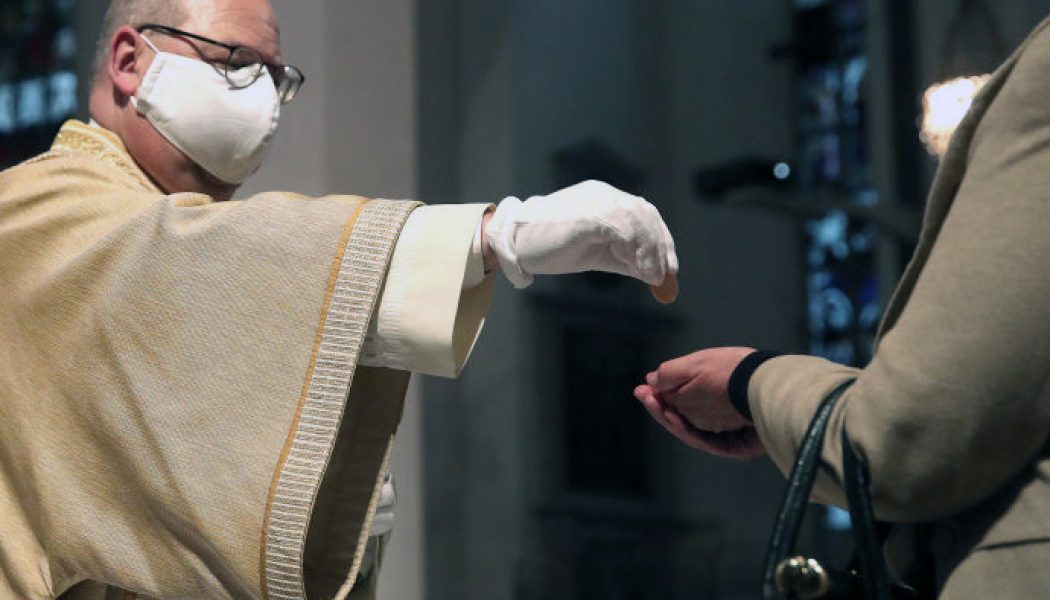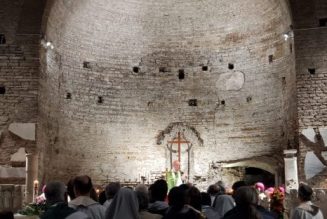
A priest distributes Holy Communion during Mass Monday at the Frauenkirche (Cathedral of Our Lady) in Munich, Germany, the first day since March that churches were open in Bavaria. Nationwide state and local governments are easing lockdown measures that were imposed in order to stem the spread of the new coronavirus. (Photo by Alexander Hassenstein/Getty Images)
“Jesus cannot be treated like this,” says the prefect of the Congregation for Divine Worship and the Discipline of the Sacraments.
Cardinal Robert Sarah has said “bizarre proposals” regarding reception of Holy Communion in Italy aimed at minimizing the risk of contagion of the coronavirus are “total madness” and represent a number of examples of the devil attacking the Eucharist.
One particular proposal, reportedly being studied by the Italian government and already adopted in some dioceses in Germany, is “do-it-yourself” Communion, whereby consecrated hosts are packaged in plastic bags so the faithful can take them away.
The practice is being proposed while public Masses remain suspended across much of Europe, depriving many of the faithful receiving Holy Communion.
Such a proposal is “absolutely not possible,” the prefect of the Congregation for Divine Worship and the Discipline of the Sacraments told the Italian Catholic news site La Nuova Bussola Quotidiana May 2. “God deserves respect; you can’t put him in a bag. I don’t know who thought of this absurdity.”
The Eucharist, he added, “must be treated with faith, we cannot treat it as a trivial object. We are not at the supermarket. This is total madness.”
Cardinal Sarah, in advocating more reverence of God at Mass, has suggested kneeling to receive Holy Communion on the tongue and for the Mass to be celebrated ad orientem. He said current proposals of distributing Communion “wouldn’t even come to mind” if people were “really aware of what we are celebrating in the Mass and what the Eucharist is.”
Noting that deprivation of the Eucharist is “certainly a suffering,” he said how to communicate is “not open to question.” It must be done in a “dignified way, worthy of God who comes to us,” he said.
When it was put to him that in some parts of Germany, such a “do-it-yourself” practice has already been adopted, he replied: “Unfortunately, many things are done in Germany that are not Catholic, but that doesn’t mean you have to imitate them.”
He also criticized a German bishop for not allowing Eucharistic assemblies, only the liturgy of the Word, saying it is “Protestantism.” He was possibly referring to the Diocese of Würzburg, which, even though the state has allowed public Masses, it has heeded health experts’ advice only to allow “non-Eucharistic worship.” Health protection is “the most important thing,” the diocese said in a statement, although it is allowing Eucharistic adoration.
Cardinal Sarah stressed that firstly, Communion is “not a right or a duty” but “a gift that we receive freely from God and that we must welcome with veneration and love.” The response to the privation of the Eucharist “cannot be desecration,” he said. “This really is a matter of faith. If we believe, we cannot treat it unworthily.”
Secondly, in the face of some parishes and dioceses where both Communion and confession have been suspended, Cardinal Sarah said “nobody has the right to stop” a priest from celebrating the sacraments, which “must be respected.” He added that even if it is not possible to attend Masses, “the faithful can asked to be confessed and receive Communion.”
The cardinal also warned about “getting used to” only following Masses on the television.
“He is flesh and blood,” he said, “not a virtual reality.” Referring to his preference for Mass celebrated ad orientem, he said the priest “has to look at God” otherwise he gets used to “looking at the camera, as if it were a show.”
“We cannot go on like this,” he said.
Cardinal Sarah reflected that a “clear attack on the Eucharist” has been taking place in “recent years” and he listed these as: “The question of the divorced and remarried, under the banner of ‘Communion for all’; then intercommunion with Protestants; then the proposals on making the Eucharist available in the Amazon and in the regions with a shortage of clergy, now the Masses at the time of the coronavirus.”
“It should not surprise us,” he said. “The devil strongly attacks the Eucharist because it is the heart of the life of the Church.”
He pointed out that he has written about this in his books, stressing that the “heart of the problem is the crisis of faith in the priesthood.”
If priests are “aware of what the Mass is and what the Eucharist is,” he said, “certain ways of celebrating or certain hypotheses about Communion would not even come to mind.
He said, “Jesus cannot be treated like this.”








